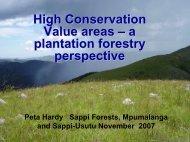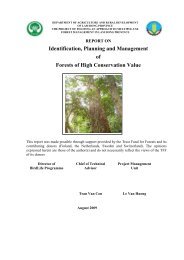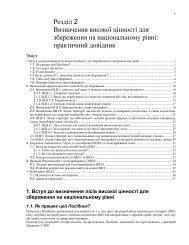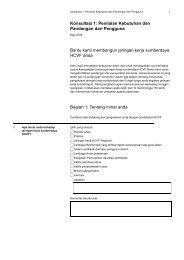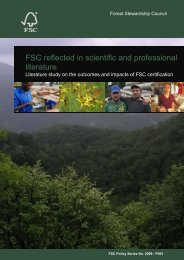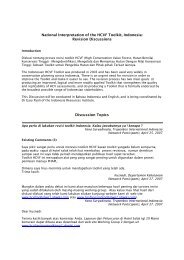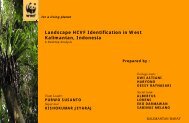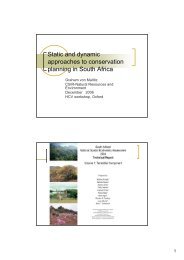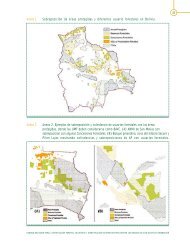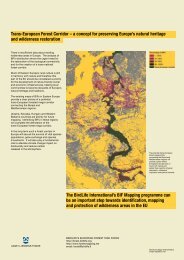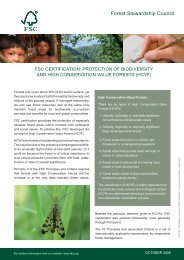Forests Sourcebook - HCV Resource Network
Forests Sourcebook - HCV Resource Network
Forests Sourcebook - HCV Resource Network
Create successful ePaper yourself
Turn your PDF publications into a flip-book with our unique Google optimized e-Paper software.
■<br />
■<br />
<strong>Forests</strong> are a global public good, and their degradation<br />
imposes global costs, such as climate change, environmental<br />
degradation, and species loss. Improving governance<br />
will help contain the negative environmental, economic,<br />
and social consequences at the global level.<br />
There are less visible—though highly insidious—costs<br />
resulting from the erosion of institutions, the spread of<br />
corruption across the economy, and lower growth. These<br />
spillover effects are the most far-reaching and significant<br />
aspects of the problem of poor sectoral governance. The<br />
problem originates in the forest sector but the impacts<br />
are transmitted through the economy, weakening governance<br />
and the rule of law, impeding investments in legitimate<br />
commerce, and undermining the overall governance<br />
structure.<br />
Some of the complexities of these relationships and the<br />
magnitude of the task to improve forest governance are captured<br />
in figure 5.1.<br />
The box in the center of the figure lists “entry points,” or<br />
opportunities within the forest sector itself, directed toward<br />
reducing the means, motives, and opportunities for crimes<br />
and misdemeanors in the forest sector (see note 5.5, Addressing<br />
Illegal Logging and Forest Crime). The surrounding boxes<br />
indicate the “embedded” nature of the problem in the economy<br />
and of the need for other sectors, institutions, and actors<br />
to support and complement the within-sector efforts at<br />
improving governance and law enforcement. They elaborate<br />
on the roles of the overall political structure; of national and<br />
international checks and balances; and the contributions of<br />
civil society, media, the private sector, and local communities.<br />
Figure 5.1<br />
Identifying “Entry Points” and a Sustainable Reform Process to Improve Forest Governance<br />
Political accountability<br />
• Political competition, broad-based political parties<br />
• Transparency and regulation of party financing<br />
• Asset declaration by legislators and parliamentarians<br />
• Disclosure of parliamentary votes<br />
Checks and balances<br />
• Independent,<br />
effective judiciary<br />
• Independent<br />
oversight institutions<br />
• Global initiatives:<br />
UN, OECD<br />
Convention, anti-money<br />
laundering and asset<br />
forfeiture<br />
Building blocks for effective<br />
forest sector management<br />
• Adequate legislative frameworks and<br />
law enforcement capacity<br />
• Robust institutions with a servicedelivery<br />
orientation<br />
• Competent leadership based on<br />
meritocracy and technical skills<br />
• Institutional oversight including an<br />
independent forests monitor<br />
• Transparent forest fiscal systems<br />
based on easy-to-track revenue flows<br />
• Sound sector policy conducive to<br />
competitive domestic markets and<br />
international trade<br />
Civil society and media<br />
• Freedom of press and<br />
information<br />
• Civil society watchdogs<br />
• Participatory country<br />
diagnostic surveys<br />
• Report cards, client surveys<br />
Private sector interface<br />
• Streamlined regulation<br />
• Public-private partnerships<br />
• Corporate social responsibility<br />
Ownership and decentralization<br />
• Property and access rights<br />
• Decentralization with accountability<br />
• Community driven development<br />
• Oversight by user groups and citizens organizations<br />
• Beneficiary participation in projects<br />
152 CHAPTER 5: IMPROVING FOREST GOVERNANCE



